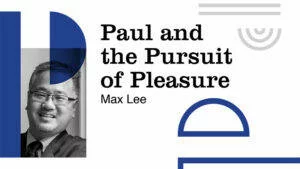 When I first read Dan Trier’s (excellent) introductory essay, which raises the question of this Areopagite, I thought about it really hard for at least an hour! While reflecting on the biblical, scientific, and philosophical material that I think I understand, a distinction between ‘chance’ and ‘randomness’ eventually emerged. You the reader will have to judge whether I’m cutting reality at its joints.
When I first read Dan Trier’s (excellent) introductory essay, which raises the question of this Areopagite, I thought about it really hard for at least an hour! While reflecting on the biblical, scientific, and philosophical material that I think I understand, a distinction between ‘chance’ and ‘randomness’ eventually emerged. You the reader will have to judge whether I’m cutting reality at its joints.
On ‘Chance’
In my view, ‘chance’ is best understood as an epistemological category, since the status of an event as a ‘chance’ event seems relative to my knowledge of myself and of the world. First, with respect to knowledge of myself, chance events occur quite apart from my own intentions and planning. When I drive to the store to get some milk, that is not a chance event. I intended to go there, and what happened is exactly what I planned.For Christians at least, this epistemological conception of chance domesticates these events while retaining their mystery. But when I unexpectedly run into a long-lost friend at the store, in no way planning for this to happen, that is a chance event. Of course, each of us as individuals clearly intended to go to the store, and those intentions were realized in our separate arrivals. But neither of us intended to meet each other at the store. Neither of us intended to arrive at the same time. That was quite outside the purview of our intentions. So chanciness is relative to description, which is how two non-chancy events put together can easily result in a (larger) chance event.
Second, with respect to my knowledge of the world, chance events must be unanticipated. This is crucial. The sun shines on me when I walk outside, and this shining of the sun ‘occurs quite apart from my own intentions and planning.’ Nevertheless, the sun’s shining isn’t a chance event, for it is well-anticipated by my knowledge of the regularities of the world. No one would say, “It is by chance that the sun shines today.” This explains why whole categories of events we used to assign to chance are categorized thus no longer – science has helped us discover more and more regularities at work in the world, and so they are wholly anticipated. Unfortunately, science can’t explain why I lost yet another sock from my sock drawer this week. I lost it by chance, for I didn’t intend it, and I know of no regularity which explains it.
For Christians at least, this epistemological conception of chance domesticates these events while retaining their mystery. It domesticates them because events thus construed can easily fit into a system of providence according to which they proceed by Someone’s planning, even if not my own. It retains their mystery because observers on the scene typically have no clue why the event occurred or for what purpose – they would likely get that wrong if they dared to guess – and this feature has important implications for both faith and life. More on that later.On Aristotle’s view, “some natural or some intelligent agent is always the cause” even of ‘chance’ events; it’s just that the result is not what was intended. Relativizing this to finite agents gets us something close to my view. Cf. Aristotle, Physics Book II, Part 6.
On ‘Randomness’
By way of contrast, ‘randomness’ is often understood as a metaphysical category, referring to events without a cause.I say ‘often understood’ rather than ‘best understood’ because intuitions divide, and for many people ‘chance’ and ‘randomness’ are interchangeable in linguistic usage. For them, dice rolls are both chancy and random. That’s fine; just find different labels for what I am talking about in this section and in the previous contrasting one and proceed. These events have no sufficient cause within nature or supernature. They proceed according to no agent’s purposes, and you couldn’t repeat them at will even if you could try. Rewind the video tape of the universe back a bit: even with the same causal powers and conditions at work as before, things could easily go in a different direction. That’s just how it is with events with no sufficient cause, whether mechanistic or teleological. Everyday experience shows us that chance events (in my sense) are a daily occurrence. Could it be that science has shown the same can be said for random events (in my sense)? It is often thought that the sciences of evolutionary biology and quantum mechanics offer confirming evidence here. Is that true?
Consider the phenomenon of natural selection, alleged to be sensitive to ‘random mutations’ which confer an adaptive advantage to organisms, giving them an edge over their peers in the struggle for survival. Those receiving the best advantages via their (partly-random) genetic inheritance are more likely to survive to bear offspring, and so their genome will tend to predominate over time and spread throughout the species, perhaps accumulating enough change to generate new species. But whether these mutations are random depends on how we understand ‘random.’ Evolutionary biology makes clear that there is “no correlation between the production of new genotypes and the adaptational needs of an organism in a given environment” (Ernst Mayr). So the mutations are ‘random’ in the sense that they occur independently of any future utility they may confer on that organism. Science also seems to suggest that “[t]here is no physical mechanism (either inside organisms or outside of them) that detects which mutations would be beneficial and causes those mutations to occur” (Elliot Sober). Indeed, there may be no sufficient physical cause for the mutation at all. But all of this is quite compatible with the mutation not being ‘random’ in the metaphysical sense I suggest—it doesn’t have to occur apart from any agent’s purposes and without any cause (physical or nonphysical). For a mutation’s having a nonphysical cause via divine agency is entirely compatible with its having no sufficient physical cause. God might bring about the mutation, but not because it has utility for that organism. Rather, he brings it about for other purposes, perhaps long-range ones. Who knows? There is no scientific reason to think that mutations come about without any cause whatsoever. That would turn genetics into a theological theory (“No nonphysical causes allowed!”). Christian readers who balk in principle at the thought of spiritual causes directly bringing about physical effects should proceed cautiously, since they are precluding not merely substance dualism at the human level, but more importantly creation ex nihilo at the divine level.For the quotations and some of the points made in this paragraph, cf. pp. 11-12 of Alvin Plantinga, Where the Conflict Really Lies, (Oxford: Oxford University Press, 2011).
As for quantum mechanics, Cal Tech physicist Sean Carroll quite recently lamented the fact that not only do modern physicists not understand quantum mechanics—what are these predictively useful mathematical formalisms actually telling us about the nature of the world?—they do not even seem interested in understanding it.Sean Carroll. “Opinion | Even Physicists Don’t Understand Quantum Mechanics.” The New York Times, September 7, 2019, sec. Opinion. https://www.nytimes.com/2019/09/07/opinion/sunday/quantum-physics.html. Do we go for David Bohm’s deterministic theory, or for Hugh Everett’s ‘many-worlds’ theory, or for the Ghirardi-Rimini-Weber ‘spontaneous collapse’ theory? Each of these approaches ‘saves the phenomena’ by being compatible with the empirical results of quantum mechanical experiments. But each says things about the nature of the universe which conflict with the other theories. (Indeed, no theory of quantum mechanics seems consistent with what we know about gravity, a point also noted by Carroll.) Since theory selection is ‘underdetermined’ by the experimental data, modern physics simply doesn’t provide us decisive or even likely guidance (at present) on the question as to whether the nature of the universe is deterministic or indeterministic.
On the Place of These Concepts Within Christian Understanding
So while it seems obvious that ‘chance’ (as an epistemological concept) is a category stuffed full with everyday examples, whether or not ‘randomness’ (as a metaphysical concept) is an empty or non-empty category is not answered by modern science. This means that theologians, biblical exegetes, and everyday Christians are free to followDoes not a large part of the literary power of the Bible’s narrative, and the spiritual encouragement it offers, rest upon this interplay between the ignorance of the human actors and the wisdom of divine providence? what they think is the best overall understanding of the biblical data on providence, doing so without embarrassment or frustration that they cannot reconcile such teaching with the deliverances of science.
I suggested earlier that by understanding ‘chance’ epistemologically, we invest in a deep biblical idea rich with consequences for spiritual life. For it is a biblical commonplace that events entirely unintended by any finite cognitive agents (whether human or angelic) nevertheless occur by way of the settled intentions of God. “The lot is cast into the lap, but its every decision is from the Lord” (Prov 16:33). “For from him and through him and to him are all things. To him be glory forever. Amen” (Rom 11:36). “In him we have obtained an inheritance, having been predestined according to the purpose of him who works all things according to the counsel of his will” (Eph 1:11).
Commitment to chance events highlights a theme of divine inscrutability which looms large in the Bible and has both pastoral and apologetic implications.A key text here is Romans 11:33–35, especially when seen in the larger context of God’s plan revealed in Romans 9–11. For multiple examples of people trying to guess God’s reason for suffering, and getting it wrong, see Job’s friends (compare Job 4:7, 8:4, 11:14, 22:5–11, 33:8–12, 34:11, 34:37 with Job 1:1, 8 and 42:7–8), Jesus’ disciples (Luke 13:1–5, John 9:1–3), and Maltese natives (Acts 28:1–6). It closes both the mouths of Christians who would insensitively offer ‘God’s reasons’ to those who suffer (when they don’t know such reasons) and the mouths of critics who would irrationally preclude there being divine reasons for the suffering. Imagine we were on the scene in the cases of Job (as his friend), Joseph (as his brother), and Jesus (as his tormentor). Would we have been able to guess at God’s purpose for the suffering? Would we not instead have been wholly unaware of any such purpose? Does not a large part of the literary power of the Bible’s narrative, and the spiritual encouragement it offers, rest upon this interplay between the ignorance of the human actors and the wisdom of divine providence? It is exceedingly hard for us to see how our “light momentary affliction is preparing for us an eternal weight of glory beyond all comparison” (2 Cor 4:17), and this is one among many reasons why in a world of chance “we walk by faith, not by sight” (2 Cor 5:7).







Comments
Be the first one to make a comment!